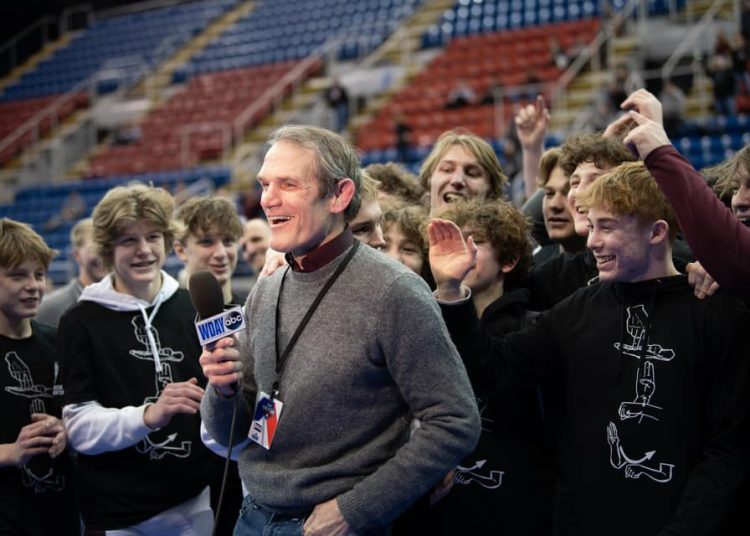🥇 Takedown Tuesday: Building Champions from the Ground Up
By Jon Gums, Dakota Grappler
While wrestlers put in the work on the mat, there’s another force driving success from behind the scenes: the coach. A wrestling coach is much more than just a strategist—they’re a motivator, a recruiter, a mentor, and a leader. As preseason approaches, the foundation for a successful season isn’t just about conditioning or drilling techniques; it’s about setting the tone, creating a winning attitude, and building champions from the middle out and bottom up.
Today’s “Takedown Tuesday” focuses on what it takes to coach a wrestling team to greatness—from motivating athletes to creating an environment where every wrestler, from rookie to elite, is pushed to become a leader.
1. Motivation: The Heartbeat of Preseason Success
A coach’s first role in the preseason is to light the fire in their athletes. Motivation isn’t a one-size-fits-all solution—it’s about understanding each wrestler’s unique drive and pushing them toward their highest potential.
- Set High Standards Early: Before the first practice, set expectations that push athletes beyond what they think they can achieve. Make it clear that the goal is to build a team of champions, and that starts with individual commitment.
- Tailor Your Approach: Some wrestlers respond to tough love, while others need encouragement. The best coaches understand how to inspire each wrestler in a way that taps into their inner fire.
- Build the Team’s Identity: From the start, make your team understand that success isn’t just about winning matches—it’s about developing grit, resilience, and teamwork. Build a culture where every wrestler is accountable to their teammates.
2. Recruiting and Developing Talent: Building from the Middle Out
A coach’s job doesn’t end with the elite wrestlers. In fact, the most successful teams are often built from the middle out—from the wrestlers who are hungry, motivated, and ready to prove themselves.
- Recruit Relentlessly: Great coaches know how to spot potential, even in those who might not stand out immediately. Recruit with an eye toward building depth—because a championship team is never carried by one or two stars alone.
- Develop the Whole Team: Focus not only on your top athletes but on the entire roster. Those mid-level and developing wrestlers often become the backbone of your squad, and when they rise, the team rises. Spend time with each athlete, helping them improve and instilling in them a belief that they can contribute at the highest level.
3. Fostering a Learning Environment: Constant Growth
Wrestling is as much a mental game as it is physical, and preseason is the time to establish a learning environment that fosters constant growth.
- Encourage a Growth Mindset: Create a culture where wrestlers aren’t afraid to fail. Failure is an inevitable part of growth, and the best wrestlers are those who learn from their mistakes, adapt, and come back stronger.
- Teach Wrestling IQ: Beyond physical conditioning, emphasize strategy and technique. Encourage wrestlers to study their opponents, analyze their own matches, and constantly look for ways to improve their wrestling IQ. A championship team is one that can outthink as well as outfight its competition.
4. Building Leaders: Empowering the Elite Wrestlers
Your top athletes are more than just point scorers—they are role models for the rest of the team. A coach’s job is to mold these wrestlers into leaders who will inspire and elevate those around them.
- Lead by Example: Encourage your elite wrestlers to not only focus on their own success but to help bring up the younger and less experienced members of the team. Their work ethic and attitude will set the tone for the entire program.
- Mentorship: Pair experienced wrestlers with newer ones in practice to foster leadership and team cohesion. Make it clear that leadership is about lifting others, not just dominating on the mat.
5. Commitment: Building from the Bottom Up
Success in wrestling doesn’t just come from talent—it’s born from commitment. Preseason is the time for coaches to instill this mentality, making sure that each wrestler understands that the road to a championship starts with dedication and hard work.
- Sacrifice: Teach your wrestlers that commitment means making sacrifices now for rewards later. Whether it’s staying late after practice, giving up free time for extra conditioning, or sticking to a strict diet, championship teams are built on sacrifice.
- Commit to the Process: Success doesn’t happen overnight. It’s the result of countless hours of hard work and dedication. As a coach, you must keep your athletes focused on the process—not just the results. The victories will come if the work is done day in and day out.
Final Thoughts: Building a Championship Mentality
A wrestling coach’s influence goes far beyond the preseason. They shape the team’s culture, set the standard for success, and turn potential into performance. The road to a championship begins long before the season starts—it’s built on motivation, hard work, and commitment. By fostering a learning environment, developing leadership, and building from the bottom up, a coach has the power to turn a team of wrestlers into a team of champions.
This week, take a moment to appreciate the dedication of your coaches, the ones who drive you toward your potential and show you the path to greatness.
Picture of Jeff Schumacher ex-Bismarck High Head Coach, now Bismarck State College Wrestling Coach
#TakedownTuesday #WrestlingCoach #ChampionshipMindset #DakotaGrappler







